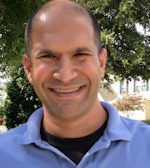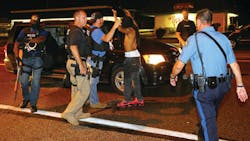After nearly two weeks of protest, violence and unrest in Ferguson, Mo., the legal case against a white police officer who allegedly shot and killed an unarmed black man earlier this month is starting to take shape.
A grand jury on Wednesday heard evidence in the case against Officer Darren Wilson in the death of Michael Brown just as U.S. Attorney General Eric Holder arrived in Missouri to discuss the details of the case with local law enforcement officers and federal investigators.
Former FBI Assistant Director Ronald Hosko, who was recently named President of the Law Enforcement Legal Defense Fund, spoke to Officer.com about the challenges officers, such as Wilson, face when involved in deadly on-duty incidents and what they can do to be prepared for the worst.
Turmoil in Ferguson
The confrontation between Wilson, 28, and Brown, 18, occurred on the street in broad daylight and quickly escalated before shots were fired. Soon after, crowds gathered at the scene and daytime protests gave way to violence at night.
"I think you have this situation that's fanned up -- frequently by outsiders who come into your town for their own purposes who fan the flames of discontent and anger, and then they withdraw -- when more productive actions could have been taking place," Hosko, who spent 30 years with the FBI and oversaw the agency's Criminal Investigative Division before retiring in April, said.
The incident has put the St. Louis suburb into national headlines with both protesters and media pundits alike calling for charges against the officer.
"It is troubling to see the rush to judgment, which I think has clearly been the case," Hosko said. "It is the job of an investigative review group at the local level, and now with the FBI, to look into the details of the incident to find fact. I believe we are probably days, if not weeks, away before conclusions could or should be reached."
The death in Ferguson has drawn attention to other officer-involved incidents across the country, magnifying those cases more than they would have been in the past. Hosko said that he doesn't believe there has been an increase in fatal incidents by police, but that certain circumstances can put a case in the national spotlight.
"I don't detect necessarily a significant trend to more police killings of citizens in the line of duty or fewer," he said. "However, when it is differing races, and certainly when the facts are not known and the flames of mistrust and of anger are fanned -- like we've seen them fanned in Ferguson -- it brings these issues and divisions to the fore."
Managing Tensions
The size of the 53-officer police force in Ferguson may have played a role in the difficulty officers had in quelling the violent protests following the incident, Hosko said. In New York City less than a month earlier, the police custody death of an unarmed black sparked demonstrations and calls for criminal charges against the officers involved, but no violence. NYPD officials have said that they moved quickly to avoid the scenario that has played out in Ferguson.
"With respect to the investigation itself, there are big departments around our country that have officer-involved shooting incidents on a regular basis. So they have a fairly mature mechanism," Hosko said. "They may have a group like the FBI does where you have a team that's done it before, that comes out and they initialize the machinery of an investigation. It's fairly practiced because it happens with some frequency. Not so much in the smaller departments, or not so much in a department that may have not had an officer-involved shooting incident in years."
In the case of Ferguson, the initial protests brought in the St. Louis County Police Department to assist the local police department, then the Missouri Highway Patrol and later the National Guard. The former FBI official said that for smaller departments, the issue of getting in front of similar situations before they spiral out of control often lies in funding.
"What is the infrastructure to have a system to get help for the officer who was involved or for the family of the deceased so there can be some piece of counseling or bringing the officer back into the fold? That's frequently dependant on resources that are increasingly scarce and have been throughout the 2000s so far. Some of these things just get under-addressed or they are not handled at all and it's up to the department to figure it out as they go; not optimal in any way, shape or form."
The Dilemma for Officers
Hosko said that the stark reality of civil lawsuits and criminal charges in on-duty incidents that result in death make such cases traumatic events that leave an indelible mark on an officer.
"A decision that might have been made in milliseconds, depending on your training and on your instincts at that moment; those decisions are going to be second-guessed, turned upside-down, shaken and turned back around. Your every move and thought is under the microscope at that time," he said. "In all likelihood, (the officer) will be financially changed at the end of it and psychologically changed as well. This is not something that any law enforcement officer comes to work looking to do."
When officers are faced with an investigation following a fatal on-duty incident, Hosko said that legal representation is a necessity.
"When something bad happens -- even if you did everything right and you got a bad result -- you're going to need help. You're going to need some counsel; you're going to need some assistance," he said.
Associations such as the FOP, police benevolent associations and other organizations offer legal counsel, which is paid for through dues.
"There are officers in our country who make a financial decision because many of them are not highly paid, that they don't have the extra money to pay for an association, and they are without counsel. Then you are on your own. You go try to find that legal counsel to help you," Hosko said.
"Financially, if it goes to charges, if it goes to trial, if it goes through an appeals process; you are looking at a very expense proposition to defend yourself. Few are going to come up and saw 'I'm going to defend you for free.' "
The Law Enforcement Legal Defense Fund is an organization focused on providing such help to officers in need.
"We look at allegations where officers are charged with excessive force or in this case, we'll see what charges result in Ferguson," he said. "We look to these cases and find ways to support financially the defense of law enforcement officers who are put to the test of making a potentially life and death split-second decision."
An Officer's Duty
Ultimately, Hosko said that despite the rhetoric of protesters or national figures following a high-profile officer-involved incident, law enforcement officers are not looking to kill civilians.
"Of (the officers) I've had the opportunity to work with over my career, I knew of none who came to work in the morning looking to kill an innocent person," he said. "In fact, we see the opposite."
He referenced a hostage standoff that spanned 20 hours between Tuesday and Wednesday in Harvey, Ill. and ended with the release of all of the hostages and arrest of two suspects after officers entered the home. While two officers were injured in an earlier exchange of gunfire with the suspects, neither suspect was harmed while apprehended.
"If the police wanted to kill, you had a prime opportunity," he said. "You had an exchange of gunfire before a hostage rescue -- a very dynamic, dangerous situation -- and why didn't the trained killers go kill?
"They didn't go kill because that's not their job, that's not why they came to work today. They came to save lives."

Paul Peluso | Editor
Paul Peluso is the Managing Editor of OFFICER Magazine and has been with the Officer Media Group since 2006. He began as an Associate Editor, writing and editing content for Officer.com. Previously, Paul worked as a reporter for several newspapers in the suburbs of Baltimore, MD.



